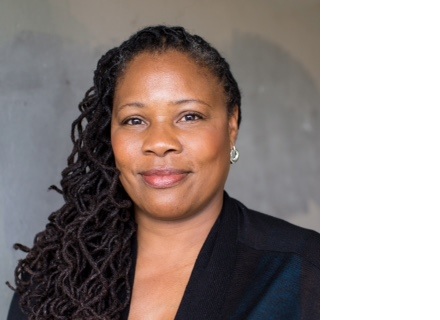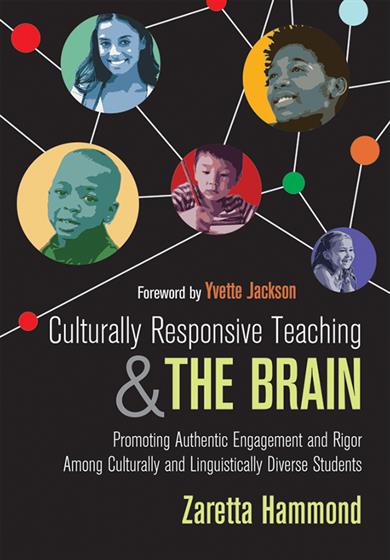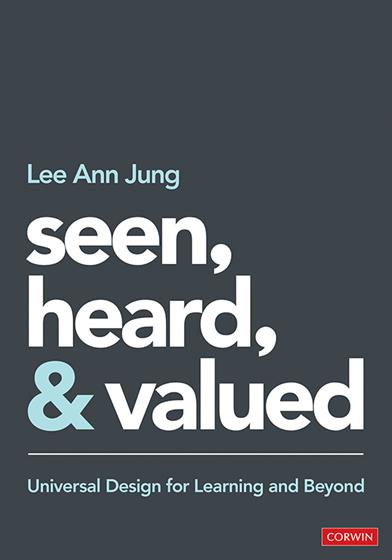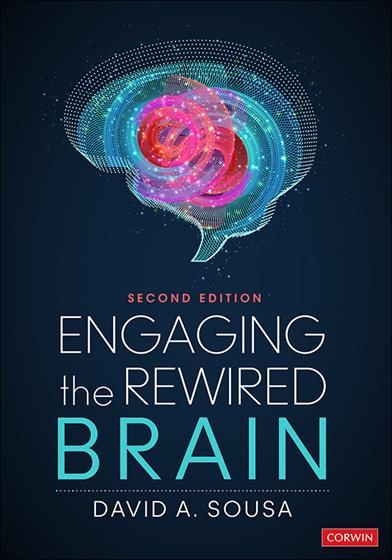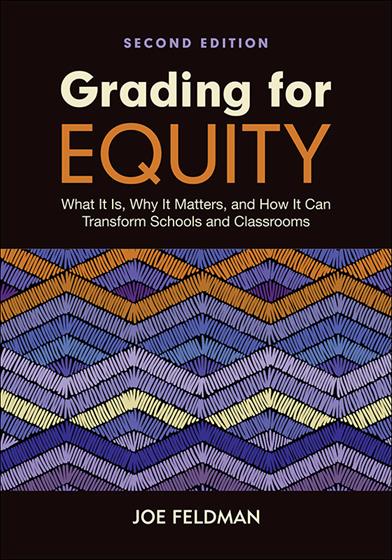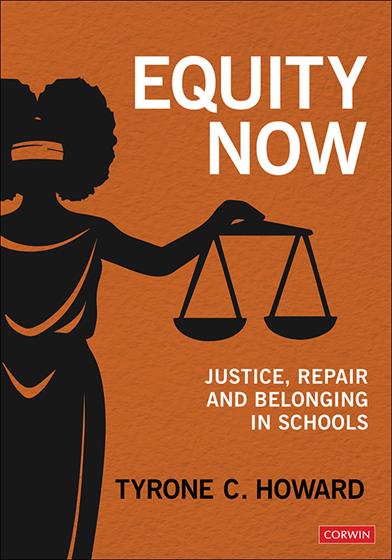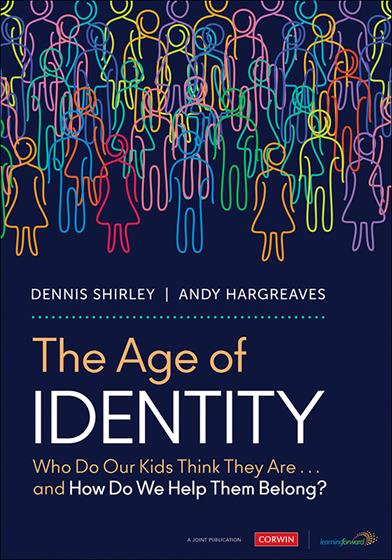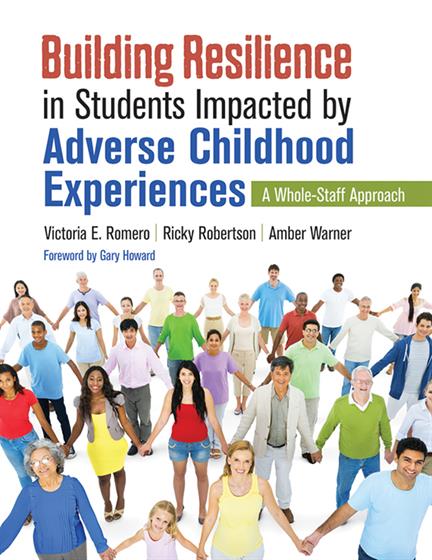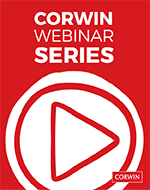ANNOUNCER: Welcome to Corwin's Leaders Coaching Leaders podcast with hosts Peter Dewitt and Michael Nelson. This
podcast is from education leaders for education leaders. Every week, Peter, Mike, and our guests get together to
share ideas, put research into practice, and ensure that every student is learning not by chance, but by design.
PETER DEWITT: Michael Nelson.
MICHAEL
NELSON:
We're back again here. Are you excited?
PETER DEWITT: Yes, I am, because we have Zaretta Hammond. And to me, Zaretta is just always amazing to talk to. She's
somebody I interviewed a few years ago for Education Week. I followed her work. I've known her for a number of
years.
So I think our audience today is going to be into some enforce, some really important information, really
important research for when it comes to learning. And this is not just for teachers to do, it's for school leaders to
do as well. But you suggest that they should actually have a piece of paper with them.
MICHAEL
NELSON:
I did. I found myself as I just feel like there you could either rewind it and listen to it again, or needed a piece of
paper because I was making this mind map of information as she was speaking.
PETER DEWITT: So for those of you that don't know, I mean, Zaretta is a former high school and community college expository
writing instructor. She's also served as an adjunct professor at Saint Mary's College School in California, where
she taught the foundations of adolescent literacy.
As a consultant, she has advised and provided professional development to school districts and nonprofit
organizations across the country around the issues of equity, literacy, and culturally responsive teaching for the
past well over 25 years.
So I'm excited for people to hear this just because I feel like Zaretta is just deeply knowledgeable. And she's
working on a new book that will come out in late winter of 2025. And she just brings so much when she's talking
about leveling up, learning, but also just the common language around how to be responsive.
MICHAEL
NELSON:
She was quite remarkable, yet she kept the students at the center. And you're going to hear that over and over
again, Peter.
PETER DEWITT: Well, enjoy the interview and we will see you on the other side. Zaretta Hammond.
[AUDIO LOGO]
NARRATOR: Say goodbye to slow-paced teaching methods and join an innovative new framework. With teacher clarity
professional learning workshops, teachers can learn how to double the speed of learning with clear goals and
measurable outcomes. Get started today at corwin.com.
PETER DEWITT: Zaretta Hammond, welcome to the Leaders Coaching Leaders podcast.
ZARETTA
HAMMOND:
Thank you for having me. I'm so excited.
PETER DEWITT: Oh, my gosh, it is so good to see you. It's been a few years. But thank you for being here. You have had a huge
influence on me. I know you may or may not remember this, but you were the second guest I ever had on a seat
at the table.
And I don't even remember what question I asked, but I remember you just said, let's unpack what you just said.
And I went, oh, no. And I emailed you a few months later and said that was the best thing that could have
happened to me because I was a guy that always thought that I got it, inclusivity, and everything else.
And I learned a lot about implicit biases and questions. And it made me so much better at talking about topics
that people find to be difficult. And as a moderator for whether it's a podcast or a seat at the table for Ed Week,
you made me better in that moment. And I just wanted to make sure I thanked you again for that.
ZARETTA
HAMMOND:
And I deeply appreciate that because I do believe that is really my mission, not necessarily to be out front and be
the person who is changing everything. It's the leaders. And my job is to support them to be the best they can be,
to hold space for those that they are trying to shepherd through transformation. And it's no small effort.
And being able to have shared language, to have the emotional resilience and stamina when conflict arises,
because that's just part of what we do and that it's not a bad thing. So I deeply appreciate that reflection.
MICHAEL
NELSON:
Zaretta, I have equally the admiration for you and have seen you speak in large audiences in many different
places and times and dates and have read your work and articles. And just you are a name if I see, I'm going to
gravitate to that piece of writing or to that video or to that conference. And my colleagues feel the same.
And so as I was preparing-- and this season, I have the opportunity to co-host Leaders Coaching Leaders with
Peter. As I was sharing that this day was coming up, first of all, often my colleagues their mouth would drop and
say, no way, you're going to be just on a small little Zoom screen with Zaretta Hammond. And I said yes.
But here's what I know. I know through the language that you use and the way in which you write, you're a
deeply humble person who really is committed to making education a better place. Having said that, our
audience I know want to know a few key things that are so vitally important.
Who do you listen to? What's a book that you currently are reading? And what's a boring fact about you? So I'm
going to just I'm going to throw those three quick things out because our audience on Leaders Coaching Leaders
desperately need to know a book, somebody you're listening to, and a boring fact about Zaretta Hammond.
ZARETTA
HAMMOND:
Yeah. Let's just start with the books. My mother was a library technician when I was growing up. That was part of
California Welfare to Work program. In order to get these benefits, you have to go to work and we're going to
place you somewhere. So that was my after school playground-- the library. So I've never met a book I don't like.
And so I do try and stay on top of what the research is saying, particularly around the science of learning, the
science of reading right now. But I also read a little bit outside of education, meaning there are a lot of good
education, authors, books being put out.
But I also know that a lot of what we should be reading as educators is just one or two steps outside of that. So I
have a tendency to read what's going on in social neuroscience. How are-- there's one right now that extended--
what is it? It's not in front of me. So it's extended body in body learning.
So this idea that cognition is not just in the head, but our body remembers. So how, when we start to think about
leveling up learning, should we make the connection to what that's saying? I think a lot of the authors that I'm
reading, because I'm writing my next book, come out of Project Zero. And I don't think they get lifted up as
much. David Perkins, he talks about this idea of the whole game of learning and helping students learn the whole
game. Then there is guy--
PETER DEWITT: Clarkson. Clarkson.
ZARETTA
HAMMOND:
Why are we all not reading him?
PETER DEWITT: I know. He's fantastic.
ZARETTA
HAMMOND:
My goodness. Because what they do, and these books are all in that same category of really pulling back the
curtain on the learning process. I feel like one of the things that happens too often, we get focused on the
strategy and therefore pour all our energy into implementation, fidelity of the strategy.
And we forget about the student. We do this thing to the students. So we want to get the moves right and
assume that it's just magical because we did all the moves right to the strategy, it's going to have a result on the
student.
And we forget that learning is dynamic. And these authors remind us of the science of learning. And in practical
terms, this is not just here's theoretical, we can go back to the classic. Make learning stick. That is, I keep going
back to that book. And it's like, oh, we should put this up and really help people understand it.
And so these are a few things that I read and continue to go back to because I do want to help educators really
understand what it means to put the student back in the center, versus strategies. Yes, you do want strategies,
but they're tools.
You're actually teaching a person and that person is a variable. And to me, this is the responsive of culturally
responsive teaching. So we have a tendency to focus on the culture part-- anti-racism and inclusion and all those
things. But we forget about the responsive.
What does it mean to be a good instructional decision maker and therefore be responsive when the student is
stuck? That's the fourth, third question. What will we do when the student doesn't learn it? So long answer for
what books capture my attention. And then I'm trying to get back to a little more fiction in my life. So slowly but
surely. What was the second question?
MICHAEL
NELSON:
Who do you admire? Who do you listen to? Who does Zaretta Hammond listen to?
ZARETTA
HAMMOND:
In terms of podcast?
MICHAEL
NELSON:
Yeah.
ZARETTA
HAMMOND:
I will have to out myself. I do not listen to education podcasts.
PETER DEWITT: There's nothing wrong with that. Absolutely.
ZARETTA
HAMMOND:
I do listen to one, and that is Tim Logan. He is in the UK. And it's called The Future of Learning. And he's got the
best guests on there. And they really, again, there's Norma Bates and she talks about warm data and this whole
way of humanizing. It's just like Ooh. And his episodes drop every Sunday. So it's my little brain candy on Sunday
morning to listen to his podcast.
Other than that, the ones that try to be practical, I think are Oversimplifying. And again, strategy stripping is
what I call it. Like, let's just find the cool strategies. And we forget about, what do you do? The student is
confused. You've tried the thing. Now what will you do?
So I limit that I do listen to other things that are of motivational and insightful about development, like stoicism.
Ryan Holiday, who's written a lot of books. He is a big proponent of stoicism. And the whole philosophy of, how do
we better ourselves?
And I think it's very much related to the idea of, how do we grow ourselves? So in terms of what I'm writing about
right now, how do we grow our own learning power? How do we start to have a sense that we don't have to live in
a pedagogy of compliance? And yeah, so that's what feeds me right now. Absolutely.
MICHAEL
NELSON:
Thank you.
PETER DEWITT: So I want to get to a couple of the things that you said. So I'm glad Mike asked those questions because then it
just led into about 10 questions that I want to ask you, but I'll just start with one.
So you were mentioning earlier about responsiveness, and I know that you're coming up on the 10-year
anniversary of culturally responsive teaching and the brain. But what does responsiveness mean? Because we're
always trying to get that shared understanding. We have a common language but not a common understanding.
And so when you're talking about-- you're absolutely right, like the strategy is the thing. But I want to learn more
about the responsiveness. What does that mean?
ZARETTA
HAMMOND:
Yeah. And what it means is educator who-- so much to say ran through my brain. Back in the day when I was
cutting my teeth as a baby teacher, I was in California and the Carnegie Foundation brought teachers together,
Lee Shulman and a whole other host of teacher educators that were on the cutting edge.
And what they talked about is pedagogical content knowledge and instructional decision making. And I think one
of the most unfortunate parts of culturally responsive teaching that has happened is people have relegated to the
relational realm. And they've not really seen the fullness of it.
And what I learned during that era of Lee Shulman and his colleagues talking about the idea of instructional
decision making was very much what I understood in the research of culturally responsive. That responsive.
How will you respond to students when they are confused, which is before, helping us understand, what do we
want students to know? How will we know when they know it? And what will we do when they don't know it?
And usually when we're talking in the instructional core, that happens when a student is confused or you see
they're making the same mistake or they seem to not understand and they're waiting for the teacher to actually
jump in there and over scaffold. So this is a response-- maladaptive response to student confusion as the
teachers over scaffolding.
So I really want people to understand that culturally responsive teaching is full body. That's why my ready for
rigor framework really does have, yes, awareness and learning partnerships, relational. And having an equity
lens on society and an anti-racist view of the world, making sure that those things don't go unchecked.
But that's just the first part. Then there's improving information processing prowess. And this really is a missed
opportunity, because that is the way that the system was set up by those that wanted to segregate and stratify
and under-educate certain groups.
And the technique was allowed to go unchecked. And that technique is simply don't give students challenging
opportunities. Don't engage them in the tools to learn how to do productive struggle, how to think deeply.
So even now that we have things like deeper learning and UDL, the universal design of learning and projectbased
learning, we still have neglected the information processing skill set.
So you can give students all these wonderfully enriching experiences. But if they don't have the internal
apparatus developed, then it's not going to result in students making meaning, turning inert information into
usable knowledge.
And this, to me, is what I see when I sit in classrooms a lot. Teachers doing most of the cognitive work, they miss
the responsive part. And they think that only means making content relevant. There's a difference between
making content relevant.
So the student's schema recognizes it and being responsive. How will I help you connect the new to the known?
Because that's what the first principle of the science of learning tells us. In order to actually make meaning, you
have to activate your schema, take in new information and connect it, integrate it with your existing funds of
knowledge. That's what information processing is.
And if you look at cognitive neuroscience, pretty spelled out process. But unfortunately, we don't require
educators in their teacher education programs to understand a lot about that. And then in order to make it
turnkey, which works against us, we oversimplify it. And teachers are still doing things to students versus
coaching students to be what I call both metacognitive and metastrategic.
So that's what I mean about it, that you can actually piece it apart, take it apart, and go deeper into the science
of learning. But a lot of people are just using it at a very superficial way-- culturally responsive teaching.
And I'm being culturally responsive because I've got more brown faces and books, or because we have morning
meetings and we do restorative circles. It's just all this check box language that doesn't actually improve the
information processing skills of the students.
And Robert Marzano in 2004, in building background knowledge, this was one of the things he said, if you don't
build information processing skills, it doesn't matter what experiences you give to students, you're going to just
continue to grow your own achievement gaps.
PETER DEWITT: And the whole time when you were talking and answering, I kept thinking about metacognition. That whole time
that the whole idea of thinking about your own thinking and all of that. I mean, I'm a guy that I was retained in
elementary school, like graduated fourth from my class from high school-- fourth from last from high school in my
graduating class.
And when I learned more about metacognition and how I, whether it's time management or study skills or
whatever it is, I mean, that was when my life changed and my grades went up and everything else. So that to me
is just everybody needs to know that, because I felt like I left high school and not having that skill.
ZARETTA
HAMMOND:
That's exactly it. And this my upcoming book is really about, how do we grow those skills? But I will say that
metacognition is tier 1-- the prep work. Because again, thinking about your thinking, but if my thinking is lowlevel,
guess what I'm thinking about?
PETER DEWITT: Yeah, that's true.
ZARETTA
HAMMOND:
Metacognition doesn't change your ability to process information. It just makes you aware of what you need to
change. The next step is what Ron Ricard, out of Project Zero, famous for making thinking visible, he talks about
metastrategic.
And that is, can you engage a student in a kind of instructional conversation to be aware of their ability to
consciously move things around, to change their learning moves, to pay attention to the information that their
errors give them, and study that as data, not as some I'm stupid or I can't get it?
So the reframing of what you need. And you need those two together. I can't just help you be metastrategic and
you're not even aware of your own thinking. Then that's where I see a lot of teachers doing the work, like do this
next and do that next.
And the student can go through the motions. But without the weirdness, it doesn't get internalized. And it's more
than study skills. It is literally processing information, so that you can go from I don't really understand what
that's about to, Oh, I see how that's connected.
And so being able to-- and that's just not a skill set I see that we're giving a lot of younger teachers who are going
through really well-developed residency programs or alternative pathways. And so there's some way that we
have to continue to support them. And this is that idea of leading with intention, that we have to be intentional to
say we know they may not get it there.
The response isn't to shake our fist at teacher education programs. It's to say we recognize this. You can only do
so much in the amount of time. And we grow as teachers. So in the first three years, this should be what we are
able to help in terms of developing these skills.
For teachers who have been in the classroom, how do we use professional learning community to help them
develop these capacities. So when they go back in the classroom with the students, they can actually be able to
coach the student to this higher level of metastrategic development, which in turn will improve information
processing, which will grow their learning power.
It's not quick and easy. And sometimes a lot of people are just looking for the give me the quick version. Give me
the microwave version. Anybody who says that, despite what's coming out of their mouth, is not committed to
equity. So again, like the old saying says, don't listen to what people say. Watch what they do. And believe them.
And if they're doing that, looking for turnkeys, having teachers over scaffold to get into high quality grade level
materials, the students should be able to access those because you've actually taught them the skills of learning,
not because teachers are breaking down and pre-chewing the content for the student. So yeah, it's a little more
complicated algorithm, but I don't think it's beyond the capacity of any teacher to learn. I've seen that actually
happen.
MICHAEL
NELSON:
I've sat here, I'm like if you were to look at my piece of paper that's right below, this is a podcast different than I
think any other ones that I've been a part of, Zaretta, because I think it's one that we want our viewers-- you
might need a piece of paper beside you.
But what's different about you, honestly, and meant to be a huge compliment, is everything that you mention or
sight is connected to one to another. And so I feel like I could see into your brain a bit of this is the idea of
learning and putting students at the center, like you said, is a strong mission, vision in putting that puzzle
together. So thank you for that.
In the last little bit, you talked about your new book, and it looks like it's going to be out and available to all of us,
maybe in the first quarter of 2025, Teaching for Instructional Equity, I think is somewhere in the name of it. And
we would love to hear your thinking behind that and give the enticing teaser to our audience.
ZARETTA
HAMMOND:
That's what you've just been scribbling on your paper.
[LAUGHTER]
That's all I think about. That's all I talk about. It's actually what culturally responsive teaching in the brain set up.
But what I found, what I made an assumption about what we were preparing teachers to do.
Most teachers are being trained to cover their content, and not necessarily to coach the student into learning how
to learn. So the book is breaking down just all of those things you just scribbled on your paper in a way that a
team could take it into their PLC and actually know what to do.
It's a playbook. It's a workbook. It's a guide book for instructional leaders. So what should be the policies and
practices that I'm putting in place to actually support these shifts at the classroom level?
And again, it's not that it's without strategies, but the teacher is the strategy. That power to coach the student.
And that means you're going to have to reorder time. That means you're going to have to actually create a
culture of errors in your classroom, where students have language and skill and time to actually talk about what
they got wrong and how that is giving them some information about what they might do differently.
Now, these are all things I touched on in culturally responsive teaching, but it was clear to me people couldn't
take it to the fruition of application, because that was not what they were given the skills and the opportunity for.
So I want to really see people leverage their professional learning communities to bring this work into that
professional learning community, because that's where they're going to be doing transformative work, inquiry
cycles for the better part of that academic year. And why not actually focus on, how are we coaching students to
level up their learning?
So in essence, that's really what it is. Everything that I've been talking about for the last 10 years, I want to give
educators, particularly instructional coaches and classroom teacher leaders, the missing manual, if you will,
around this idea of instructional decision making and coaching students to a higher level of learning how to learn.
PETER DEWITT: See, and I think we need to bring it up a level too. I don't think it's just the PLCs when I hear you talk, because
one of the things that-- Mike and I always focus on collective leader efficacy. So shared understanding, engaging
in joint work, and evidence of impact.
And when you were talking, there are topics you're talking about and there are things you're talking about that
there are people in the school that don't know. You know this already because you said they weren't doing it
necessarily with culturally responsive teaching.
So when I look and say, yeah, I think it's great, the PLC should be able to do it. But as a former school building
leader, I want to know too, because if I'm coming in to do observations, if I'm doing walkthroughs, if I'm just
having a conversation with you in general and want to be able to support you, I need to know this information
too.
And it also made me think of Vivian Robinson's work around promoting participating in teacher learning and
development. To me, anytime I've talked to you and hear you today, to me, what's exciting is I don't need to
know it all right now. I want to learn it with my teachers at the same time.
And I think there's a fear there because this is a Leaders Coaching Leaders podcast. And there are going to be a
lot of leaders listening. My thinking is sometimes the go is going to be, yeah, teachers need to know how to do
this, but they need to know it too.
And Mike and I were both principals. Mike was a superintendent. To me, it speaks to what we want out of
leadership, which is I need to be sitting at the table and my instructional leadership team meeting and having
these discussions to learning it with my teachers and being OK to model to my teachers to say I don't know it
either.
I want to learn it through our discussions and reading this book and putting some of these things into action. And
I don't think-- there's not a question there, but I guess the question would be, how do school leaders let
themselves off the hook to be prepared for errors as much as we want teachers to be able to?
ZARETTA
HAMMOND:
Right. And I think this is a great question or a point you're lifting up because a lot more of the folks that I end up
talking to and coming together with are leaders and superintendents. But we have long conversations.
Some just pop into my inbox, because they are feeling at a impasse, change is necessary. They see it walking
through their classrooms. But what it actually takes to shift people is really the challenge. So I call that change
management for equity.
So how do we engage them in not only thinking about the learning how to learn, so that we're all on the same
page? Any kinds of walkthroughs are going to be aligned to that. So teachers don't feel like that, well, the
principal wants me to do this, but you're saying to do that.
So the principal, as instructional leader, has to create that alignment. How are we using time? What do we need
to keep doing because we know it's moving things forward? What do we need to stop doing because it's having
no impact or maybe a negative impact?
This is what Hedi tells us about effect sizes of particular practices. How, in that instructional leader role, can the
principal, the AP teacher leaders actually walk point for those plcs? So I don't think they are learning all the same
things, but there is the intersection.
So when I would gather teams to do some learning together, I always ask that it was a cross role team, that if
teachers and coaches and leaders were not talking together, they would not have shared language. They would
not be on the same page.
So if we think about it like building a machine, there are different people or assembling a car, different people are
putting different parts on. But you have to know we're assembling a car. This is what we're actually doing. And
the leader has a really particular role in buffering.
We go back to what Dr. Richard Elmore said about the instructional core, that it's not just what's going on in the
classroom, but that buffering that happens. The culture that supports this. The policies that support it. How the
instructional leader interfaces with the board.
So the board doesn't start with craziness, like we're going to ban books and we're going to do like-- they could--
we love the school boards, but they are going to come up with some stuff sometimes that the instructional leader
really needs to be the universal translator.
Here's why we do this. Here's the research behind it. Here's the buffering that we need to do. Here's historically
how that's been part of reinforcing inequity by design. Help people see what doesn't appear racialized actually
has a racialized outcome.
And I think sometimes we don't give leaders the credit that they deserve for the important role they play in
managing that change. They also need to understand, what are the learn to learn processes? What should I see
when I walk into that classroom?
So I can actually talk with my coaches and teachers are on the same page about what part of their practice they
need to come together other and think about? What other qualitative data do we need to be looking at? Not just
the quantitative data of year end achievement test, standardized tests. There are a variety of other data.
And some people have really leaned into street data. I think that's very valuable. But there are also other types
of data around learning how to learn that are critically important. So being able to create the integrated process
with all of those is so important.
And pretty much that is going to be falling to the leaders. So they need to be learning alongside their teachers,
but not just like, oh, I've got to be at zero. You need to be two steps ahead of them. So maybe you with your
instructional leadership team should read the book first.
You should talk about aligning things before things are rolled out to the teachers. I see everybody just let's just
all do a book study and there's going to be a Vulcan Mind Meld that comes, like we've read the book and now
we're all going to be able to help students improve their information processing. Information is not
transformation.
And I think it's the role of the leader, that intentionality around navigating the liminal spaces as we move from a
particular stage of change to deeper types of change. And with it, the human side of change, it's really, really
critical. It's no small job.
I take my hat off to leaders. But it takes a village to give them the kind of support so that they can stay the
course. There's so many forces saying, just go back to status quo. But that's inequity by design talking.
PETER DEWITT: And just before Mike asks you a question, I just want to say, too, that when you have an instructional leadership
team, like reading your book and understanding these things, it's also important for them, just like you've been
connecting the dots for people, for that leadership team to actually look in the classrooms to see how this work is
being done already, as opposed to saying, I just read Zaretta Hammond's book.
And guess what? We're going to get to do because that makes you the enemy. And what they need to be able to
do is really look and say, how are we doing some of this work already to connect the dots for teachers, so they're
not scared to move in that direction too.
ZARETTA
HAMMOND:
And Peter, here's what I'd also just say right before that. They need to just assess current reality. So before you
start doing anything, what are we currently doing? Because if you just add new things to mask some of the
damaging things you do, then you're going to run out of time. This is part of the conversation around teacher
wellness and overwhelm that there are just things we need to stop doing.
PETER DEWITT: And implementation and abandonment of low value practices.
ZARETTA
HAMMOND:
Absolutely. And at the same time, we're habitual creatures. We've been doing it forever. So the degree to which
that's where change management for equity is really important, what will you need to do?
Because a book I really enjoy. It's an oldie but a goodie, 1994. You would think that the book has nothing to tell
me. This is by Robert Evans-- The Human Side of Change. This doesn't change. And what he makes-- the point he
makes, which I think is so brilliant, he talks about anytime you have a change initiative, what's going to happen
is some people are going to experience emotions and those emotions can be lost.
It can be confusion, not because they're confused about the change, but because when I stopped doing
something out of a routine, I'm just disoriented. And then there's an emotional response. And with that, certain
behaviors.
Then he says, there are some people who are going to see this change as an affront to their competence. Oh, you
want me to stop doing that because you don't think I'm good enough? It's like the leader now has to do all of that.
So, how is the preparing the instructional leadership team for this onset of emotions that's going to come
because we do that? But when you can use the science, when you can use the data to say what is not getting us
any impact, but it's going to give us back time, it's going to give us back calm and let people see what they
actually get.
That's why I said leading with intentionality is the intentionality. This is why I love The heath Brothers. how to
change when change is hard. Switch is the title of the book. Subtitle, how to change when change is hard. And
that's what they talk about.
Shape the path. This is where we're going, why we're going there. Direct the writer, the rational mind. And then
the elephant. The emotional part of that. If the leader does those three things based on that framework, I think
you're in a good position to help people really do the deep work of change, not just book steady strategy strip.
And we're going to start doing these new things when this bad thing over here needs to stop.
MICHAEL
NELSON:
Incredible language and words. And what I think I appreciate is you never forget the student. So I believe if we
were to do a word cloud on this interview right now, the word student would be the most predominant word that's
been used.
And I can tell you that's not common when I hear leaders talk, state and federal leaders, that's forgotten. And
you go back to here we're trying this strategy, and all of a sudden, we're not using that word, the word student.
And I have to say-- and this may be a bit of a surprise to question to you, but I'm really curious. I'm in the season
of my life where I'm going to have grandchild number 4 coming in September in the last four years. So four years
and we've increased our family by four.
And as I think through, it's like put the student back in the center of strategies. If I'm a parent, it's like put my
child back in the center, not strategies. Do you have wisdom from the parent side? I'm just sitting here listening
and thinking, oh, there's a companion book for young families. I think of my two sets of kids that have these two
children. And there's learning from a parent perspective. So any wisdom for families around this concept?
ZARETTA
HAMMOND:
When I started working on more equitable learning, and there was not a great receptivity to talking about equity,
let alone using more culturally responsive practices, I always extended my skill set to parents who were bumping
up against these things.
So I would get emails from parents who were in the classrooms of my children in the school, they're about to
send my young child, classmate of my daughter's. I'm thinking back to that experience to special education.
Young Black boy, not having any real problems. He just was a slow to developing his reading skills.
But for them, that was caused to put a variety of other labels. I mean, it got to the point that this was happening
so often that I put together-- here's a letter template. Fill it in with this. This is going to get you six weeks. Just
because of the laws, it's going to get you six weeks.
This is what we'll do. I put a plan together and start to have a little kit in which it's like, here's the things you
need to do, because very much like back in the day, Jarvis Givens for anybody who's interested in reading his
book, he's an assistant professor at Harvard.
His book is Fugitive Pedagogy. And he talks about what Black teachers used to do back in the day. They'd get
this low level curriculum designed to underdeveloped cognition. And the teachers would look like they were
going through that curriculum.
And then when the White headmaster would walk out, they'd just throw it to the side and go back to doing the
more rigorous and empowering kind of teaching. It wasn't even just the content. It was that they just got to do
powerful learning.
So what I try to do is, even before I knew about that book or even the history of that, I would just prepare that for
parents like, here's how you do that. And you don't have to make it look like school. You have to hide the
vegetables.
And I would teach them how to hide the vegetables. How do you make sure you know where your child's reading
skills are? Don't just rely on the school. And it seems so counterintuitive if you are promoting schools.
I'm not anti-school. But if school is not getting it done, do not depend on that. Here's what we do. I train tutors in
reading development. So a lot of my career back in the day, probably for 15 years, was parent support. Lots of
workshops and church basements where parents gathered who wasn't just at that church. That's just where we
could kind of gather.
Because we were still not close to what we talked about in terms of community schools and 21st century schools.
We talked about schools being that center of the community in which we had multiple uses and parents could
gather. We never fully realized that.
And so the reality is parents want their children to be successful. And too often what we're equating with success
is you've got to be the fastest or you've got to get the best grades. Whereas if you're the most powerful learner,
that's going to count for a lot. If you have intellectual curiosity, that's going to account for a lot.
These are things that parents can cultivate. If you gamify and you and your child are playing games-- I had to
educate parents that rather than trying to teach your two-year-old to read, get mazes, because that develops the
beginning hand-eye coordination that lays the foundation for reading.
Puzzles. Parents don't know the science of learning is so powerful. Puzzles are the laying the foundation for
students to be able to read and discern and discriminate the symbols that we then connect sounds to.
So long before you have to get flashcards in kids, because there are things children don't want to do. They don't
want to come home and have learning look like more school. Like oh, we have a more school now? No, I will not
be having a serving of that.
So hide those vegetables. Make learning fun. And it should be. Learning is not the exclusive domain of schools.
Humans are going to learn throughout their life. And even as you said, you're growing your family, you're getting
more grandchildren, you're still growing.
So we don't give up on that. I'm in that season of my life too. My children may not give me grandchildren. We
stopped that conversation. But the reality is-- I've been in education 30 plus years. And so knowing that you
really have to help parents understand, it's a both and.
Trust teachers, partner with teachers. Karen Mapp really talks about that work. But also know that we are the
first teachers as parents. And we have that responsibility to protect our child's intellectual curiosity. Dr. Bettina
Love calls it spirit murdering.
MICHAEL
NELSON:
I love that.
ZARETTA
HAMMOND:
Right. That idea of a pedagogy of compliance, where the student is told not to talk or when to move and go check
the classroom. If that's what it looks like, then you need to really be active in the school to help them understand
that's not the healthiest thing for intellectual curiosity. So I do think there's a realm of dispositions as well as
skills that parents can help with. But we don't need to replicate school at home.
MICHAEL
NELSON:
Thank you.
PETER DEWITT: That is a perfect way to end the podcast. Zaretta, I can't thank you enough. I'm always grateful for time to be
able to talk with you. So thank you so much for being on our Leaders Coaching Leaders podcast.
ZARETTA
HAMMOND:
Absolutely. Well, thank you for having me and allowing me to talk about my new book. And I look forward to
being back and talking about it some more down the road.
PETER DEWITT: Yeah, for sure. I definitely are looking forward to reading it and asking some deeper questions too. All right,
Thank You so much.
MICHAEL
NELSON:
Thank you.
[MUSIC PLAYING]
Peter, Zaretta was pretty amazing, don't you think?
PETER DEWITT: Yes. It's just really interesting to talk to her because she brings so much to the conversation, from the learning
space to the equity space to the leadership involvement to the teachers. I felt like I wrote down a list of about
eight or nine books that I need to buy or repurchase. But I really valued.
And you pointed this out really well. I really valued how much she kept the conversation with the student. And
you were the one who pointed that out during the interview and also before we started too.
MICHAEL
NELSON:
She really did. Everything that she looped back as our listeners who are finishing this podcast with us could have
a testimony that she did say that. And she uses terrible word, Peter, but she uses learning.
This is the 10th year anniversary for cultural responsive teaching in the brain. And her new book is coming out.
She's just putting the final stages of it. And she talked about it's taking the book that she wrote 10 years ago.
And after lots and lots of conversations that she thought may the book itself could move into the application,
realizing it didn't. And that when we're teaching something and if it's not fully there, we need to rethink how we
approach that.
And so this new book really is going to tie to the application side of the culturally responsive teaching. And when
she said that, I thought, there's a readiness. There's a readiness I think in education that what maybe wasn't
quite there 10 years ago. I think when this book comes out, it's going to be an immediate bestseller.
PETER DEWITT: And that's a really good point. You just made me think about the cautionary tale with all this. And this is, I guess,
how we can end is that the cautionary tale is you write a book and you put as much research and practice into it.
It's not until after it comes out that you see how people are using the actual book that's been published. So I
think the cautionary tale is for those of us that not only write books, but for those of us that actually are reading
these books, whether it's education or non-education, are we really sure that we're putting these things into
practice in the way that we should be?
Or are we putting them into the practice that we're just thinking is the correct way, right? So it's like, that's why I
love working with you-- having a thought partner. Being able to read the same thing and having you come at it
from a different perspective makes me relook at what I've read to make sure that I processed it correctly or
understood it correctly. And I think that's part of the maube the underlying theme with Zaretta' interview as well.
So, as always, if you enjoy the podcast, please give us any sort of feedback. But we think that a lot of the podcast
interviews you're going to hear this season, just like in previous seasons, but our guests are really bringing it.
And I think these are podcast interviews that you're going to want to hear over and over again. So as always,
thank you for listening to the Leaders Coaching Leaders podcast. Michael, it is always good to see you.
MICHAEL
NELSON:
Always good to see you, Peter. And as Zaretta would say, stay intellectually curious.

